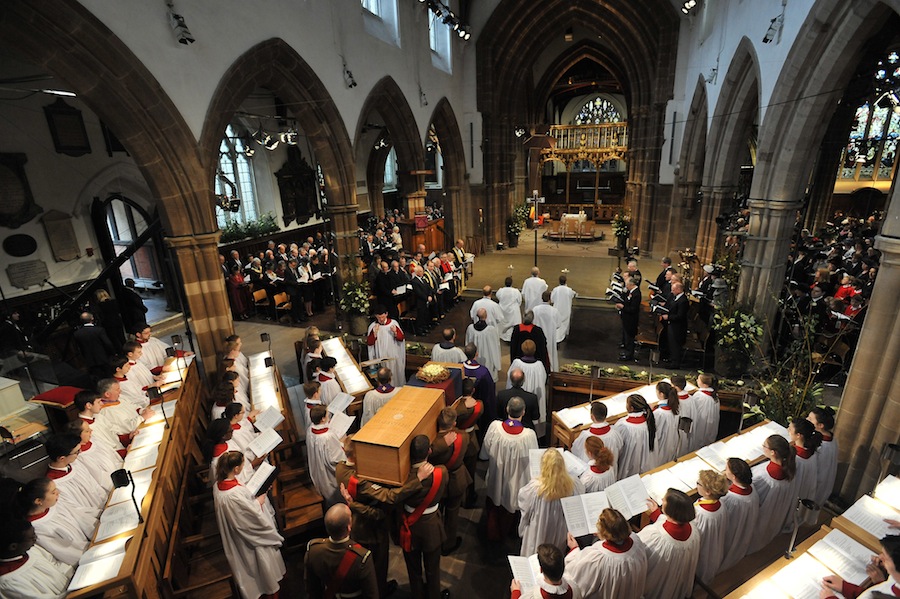Richard III Gets a Regal Tomb 530 Years After His Death

Get the world’s most fascinating discoveries delivered straight to your inbox.
You are now subscribed
Your newsletter sign-up was successful
Want to add more newsletters?
Join the club
Get full access to premium articles, exclusive features and a growing list of member rewards.
One of history's most infamous kings, Richard III, was reburied today (March 26) in a lavish ceremony in Leicester, England, 530 years after his violent death in battle.
Capping a week of events and processions celebrating the medieval monarch, Richard's stark oak casket was lowered into a brick-lined vault near the altar at Leicester Cathedral in front of hundreds of people today.
In 2012, archaeologists seeking Richard's lost grave amazingly found the king's battle-scarred bones under a parking lot in Leicester. [Photos: Richard III's Reburial in Leicester]
Richard was the last English king to be killed in battle and the last member of the House of York to rule England. After Richard's death, in 1485, Henry Tudor took the throne as Henry VII, and a group of Franciscan friars buried Richard's wounded body without so much as a coffin or shroud in a rough grave in a monastery known as Grey Friars.
When Richard's skeleton was discovered in the ruins of Grey Friars, it provided scientists a rare opportunity to intimately examine the body of a historical figure. Studies on Richard's remains over the past two and half years determined that he suffered from scoliosis and a roundworm infection, and that his death was quick and violent. The king's bones and teeth proved he ate well during his reign. His genome has been sequenced, which helped geneticists uncover evidence of infidelity in Richard's family tree.
But Richard had to be reburied according to guidelines for excavating human remains adopted by English Heritage, an organization that advises the British government on historical issues. The friars who initially buried Richard 530 years ago likely gave him a minimal Catholic funeral service, so the reinterment was technically not a funeral, but rather a celebration of Richard's life, according to the University of Leicester.
The entire spectacle wasn't without controversy, as Richard's reputation still inspires debate. Some of Richard's fervent modern-day supporters were upset that the king, who was Catholic, was getting buried in an Anglican cathedral, or that he was being buried in Leicester rather than in York, where he spent much of his life. Some also didn't like the design of the tomb.
Get the world’s most fascinating discoveries delivered straight to your inbox.
Richard's detractors, meanwhile, questioned the propriety of giving the king an extravagant reburial (estimated to cost 2.5 million British pounds, or $3.7 million) when history has cast him as a power-obsessed villain who allegedly murdered those who threatened his ambitions (including his two young nephews). The headline for one editorial online in The Daily Mail read, "It's mad to make this child killer a national hero: Richard III was one of the most evil, detestable tyrants ever to walk this earth."
Tim Stevens, the bishop of Leicester, addressed Richard's contested legacy during the reburial ceremony, saying that that legacy "will, like so many great figures in history, continue to clarify and evolve," according to the Telegraph.
"But reputation does not have the last word, for Richard or for anyone else," Stevens added. "Today, we come to accord this king, this child of God, these mortal remains, the dignity and honor denied them in death."
Actor Benedict Cumberbatch — who is distantly related to Richard and will play the king in an upcoming BBC series, "The Hollow Crown" — attended the ceremony and read a poem called "Richard" written by poet laureate Carol Ann Duffy:
My bones, scripted in light, upon cold soil,
a human braille. My skull, scarred by a crown,
emptied of history. Describe my soul
as incense, votive, vanishing; you own
the same. Grant me the carving of my name.
These relics, bless. Imagine you re-tie
a broken string and on it thread a cross,
the symbol severed from me when I died.
The end of time – an unknown, unfelt loss –
unless the Resurrection of the Dead …
or I once dreamed of this, your future breath
in prayer for me, lost long, forever found;
or sensed you from the backstage of my death,
as kings glimpse shadows on a battleground.
Follow Megan Gannon on Twitter. Follow us @livescience, Facebook & Google+. Original article on Live Science.

 Live Science Plus
Live Science Plus










